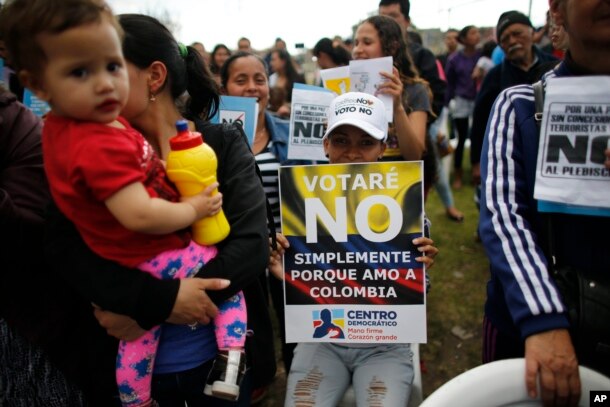Colombian President Vows to Keep Striving for Peace After Winning Nobel Prize

Colombia’s President Juan Manuel Santos was awarded the Nobel Peace Prize on Friday for his efforts in securing the end of a five-decade conflict with Marxist rebels.
«I’m so honored and so grateful…this is a very important event for my country, for the victims of this war and this is a commitment to keep trying to bring peace to my country,» Santos told the director of the Norwegian Institute in Oslo when he called to tell him the news.
«This honor is not mine, but rather for all the victims of the conflict. Together we will win the most important prize of all: PEACE,» the Colombian president later tweeted in Spanish.
Santos signed a historic peace accord last month with Revolutionary Armed Forces of Colombia (FARC) leader Timoleón Jiménez, known as Timochenko. It ended Latin America’s longest-running conflict, though the treaty was later rejected by a majority of voters in a referendum.
«The fact that a majority of the voters said no to the peace accord does not necessarily mean that the peace process is dead. The referendum was not a vote for or against peace,» the Nobel nominating committee said in a statement.
The committee said the «no» vote opposed a specific peace agreement. It encouraged all sides to continue a national dialogue aimed at advancing the peace process.
«Striking a balance between the need for national reconciliation and ensuring justice for the victims will be a particularly difficult challenge. There are no simple answers to how this should be accomplished,» it said.

Opponents to the peace deal signed between the Colombia government and rebels of the Revolutionary Armed Forces of Colombia, FARC, attend an event to promote the «No» vote in the upcoming referendum in Bogota, Colombia, Oct 1, 2016.
‘No’ vote
Voters narrowly rejected the deal, with 50.2 percent voting «no,» representing a margin of just 54,000 votes. Public opinion polls going into Sunday’s voting forecast the referendum would pass by a 2-to-1 margin.
Santos said earlier this week he would extend a cease-fire agreement reached with the rebels to October 31 in an effort to facilitate negotiations, but his offer was met with skepticism by Timonchenko.
«And after that the war continues?» the rebel leader responded on Twitter.
The United Nations also remains fully committed to the peace process and will continue to help the government reach a deal with the rebels, U.N. Secretary General Ban Ki-moon said Monday.
Ban also said he has «urgently» dispatched special representative Jean Arnault to Havana, Cuba, where rebel representatives and Colombian officials were meeting to try to save the peace deal.
«In Cartagena, I witnessed a profound desire of the Colombian people to end the violence. I count on them to press ahead until they achieve, secure a lasting peace,» Ban added.
Peace agreement
The peace agreement was aimed at formally ending the 52-year uprising by the leftist rebels. The guerrilla war in Colombia has killed more than 220,000 people and driven millions from their homes.
A renegotiation of the peace deal seems to hinge on whether rebels would accept tougher terms.
Many «no» voters were offended that nearly all FARC rebels would avoid prison time for crimes allegedly committed during the uprising, and would get various levels of financial support from the government.
They are also upset that FARC would be guaranteed seats in the Colombian Congress without an election in exchange for transforming FARC into a political party.
Rebels ask for forgiveness
Timochenko had publicly asked for forgiveness for whatever harm was committed by the rebels during the long uprising.
The Nobel committee said despite the referendum’s «no» vote, Santos’ efforts had «brought the bloody conflict significantly closer to a peaceful solution.»
“His endeavors to promote peace thus fulfill the criteria and spirit of Alfred Nobel’s will,” it said.
The last time a nominee from Latin America won the award was in 1992, when Guatemalan human rights activist Rigoberta Menchu was honored for her work promoting social justice for indigenous people.
State Department correspondent Steve Herman contributed to this report.

